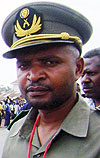EASTERN DRC - Non-governmental Organisations and journalists operating in the Eastern Democratic Republic of Congo have revealed that the security situation in South Kivu province is worsening after the FDLR rebels attacked villages were they looted and raped women.


EASTERN DRC - Non-governmental Organisations and journalists operating in the Eastern Democratic Republic of Congo have revealed that the security situation in South Kivu province is worsening after the FDLR rebels attacked villages were they looted and raped women.
According to Radio Okapi, the villages of Magunga and Mugaja in the territory of Uvira, South Kivu were attacked by FDLR rebels recently.
In a separate incident, the rebels are reported to have recently attacked, ransacked as well as set fire on a civilian hospital in the locality of Shabunda, in South Kivu, in addition to abducting several hospital staff.
Hundreds of civilians have fled the areas.
Speaking to The New Times from South Kivu yesterday, the deputy spokesperson of the Congolese Army (FARDC) in the East, Capt. Olivier Hamuli, confirmed the fresh attacks but downplayed the gravity.
"Generally, we are conducting some operations, and as of now, all FDLR positions have been destroyed – their major activities now is to burn houses, rob some cows – that is just their means of survival,” Capt. Hamuli said.
"They are operating in small groups of five to seven – we are planning, together with MONUC, to fight them in all areas because most of them are now forging alliances with local armed groups.”
Reports say that during the rebels’ last attack at the end November, over 25 families were affected in Magunda.
The FDLR, with help from Mai-Mai militias of the Kapopo group, looted cows, goats and sheep as well as money, reports say. Four women were raped.
Recent revelations by a UN group of experts indicate that the FDLR, remnants of perpetrators of the 1994 Genocide against the Tutsi in Rwanda, have a world-wide network.
The UN experts base their findings on evidence gathered after tracking down 240 calls between German-based FDLR leader Ignace Murwanashyaka and his military commanders in DRC.
Ends


